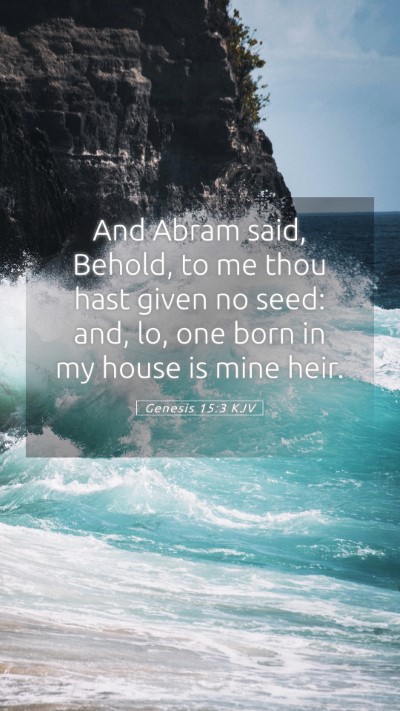Understanding Genesis 15:3
Genesis 15:3 states, “And Abram said, Behold, to me thou hast given no seed: and, lo, one born in my house is mine heir.” This verse encapsulates a moment of deep personal reflection and longing for progeny from Abram, who later became known as Abraham.
Context of Genesis 15:3
This passage occurs during a significant moment in Abraham’s journey. God has previously made a covenant with him, promising land and descendants. Yet, at this point, Abram is troubled due to his childlessness and the apparent delay of God’s promise.
Bible Verse Meanings
- Desire for Legacy: Abram's concern highlights the human desire for legacy and the passing on of heritage, foundational themes in Scripture that resonate with many believers.
- God's Promises: This verse underscores the tension between human expectations and divine timing. Abram expresses doubt, but God's plan involves more than what he can currently see.
- Covenant Relationship: The verse reflects the deep, personal relationship Abram has with God. He is not shy to express his feelings of inadequacy and challenge God's promises, showing an honest dialogue with the divine.
Bible Verse Interpretations
Commentators have elaborated on several aspects of this verse:
- Matthew Henry: He emphasizes the futility of wealth without heirs. Abram feels the weight of his inheritance when he reflects on having no children to inherit it, pointing to the spiritual inheritance promised as well.
- Albert Barnes: Barnes notes that Abram is recognizing the inadequacy of his current situation. He points out that one born in his house, a servant, would not fulfill God’s covenant of many descendants.
- Adam Clarke: Clarke remarks on Abram’s clarity of thought. He expresses his concerns directly to God, showing that God welcomes sincere prayers, which form part of biblical study insights.
Biblical Exegesis
To properly understand this verse, it is essential to analyze it within its wider narrative context:
- Covenant Context: Genesis 15 is pivotal for understanding God’s covenant with Abraham. The mention of heirship becomes a metaphor for faith in God’s promises.
- Historical Context: During Abram’s time, offspring were seen as blessings from God. Having children was a crucial aspect of one’s legacy, which enhances our understanding of his concern.
Applying Bible Verses to Daily Life
The themes in Genesis 15:3 can inspire believers today:
- Trusting God’s Timing: Like Abram, believers might find themselves waiting for promises that seem delayed. This verse serves as a reminder of the importance of patience and faith.
- Honest Communication with God: It encourages openness in prayer. Just as Abram voiced his concerns, individuals can bring their doubts and fears before God.
Significance of Genesis 15:3
Understanding this verse is essential for deducing how God interacts with humanity. It illustrates both the frailty of human faith and the strength of God's promises.
Related Bible Cross References
- Genesis 17:4: God promises that Abram will be the father of many nations.
- Hebrews 11:8-12: Discusses Abram’s faith and the fulfillment of God’s promise.
- Romans 4:18-21: Connects Abram’s faith to the theme of believing in God’s promises against all odds.
Conclusion
In conclusion, Genesis 15:3 encapsulates critical themes of longing, legacy, and divine promise. Through the lens of public domain commentaries, one can gain in-depth Bible verse analysis, enriching one's understanding of Scripture and its applications for daily life.


